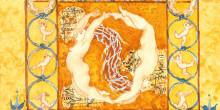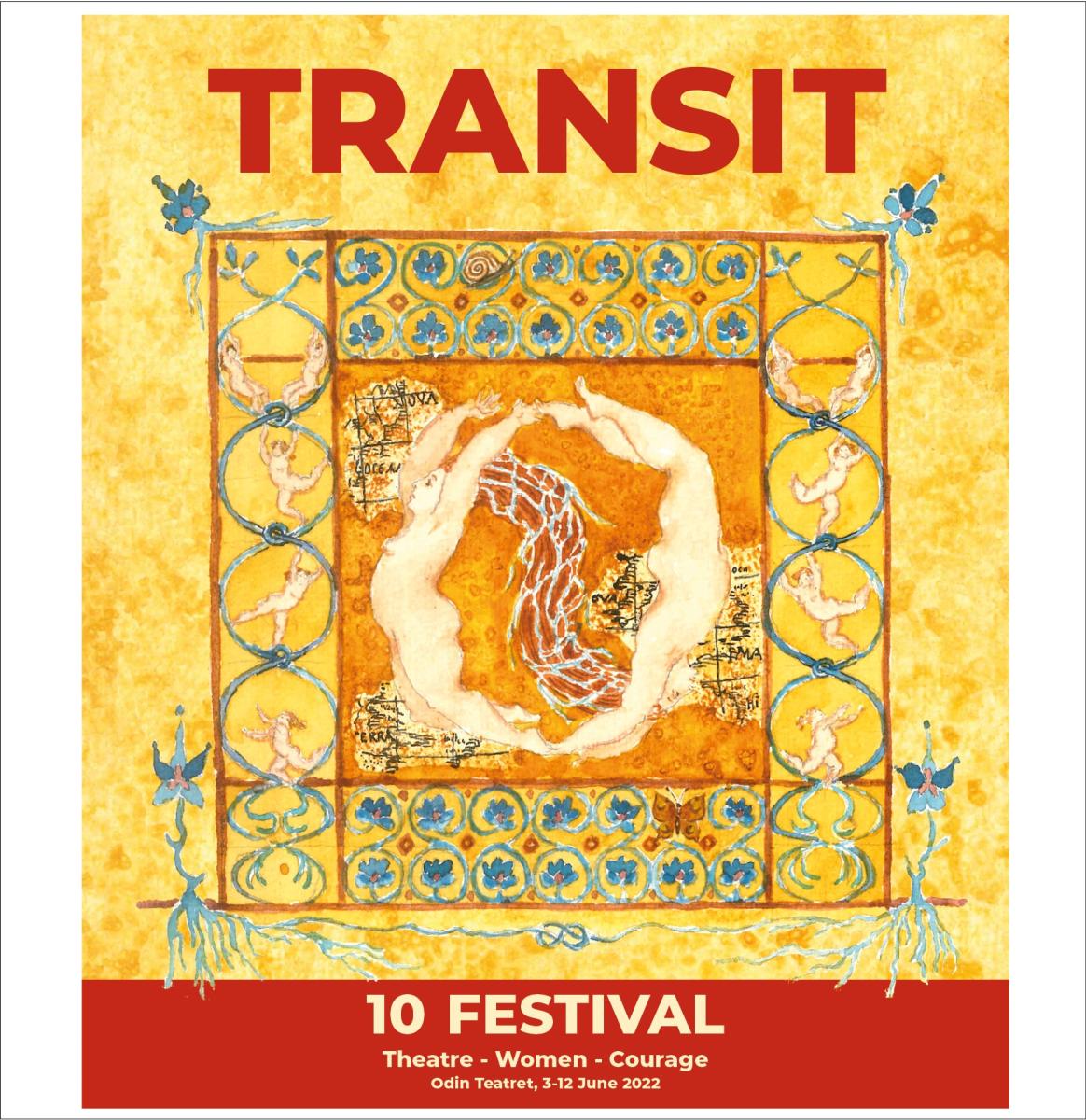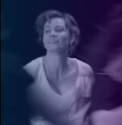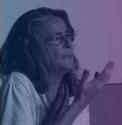
Transit x - The Splendour of the Ages
NORDISK TEATERLABORATORIUM and TRANSIT NEXT FORUM present
Transit 10 Festival
THE SPLENDOUR OF THE AGES
Theatre - Women - Courage
3-12 June 2022
at Odin Teatret, Holstebro, Denmark
Dedicated to Else Marie Laukvik, one of the founders of Odin Teatret
Video Documentation
Video report by Keiin Yoshimura
 The 10th Transit Festival represents a milestone and marks a need for change. The Magdalena Project has built an environment where women of different generations exchange and work together. Activism will confront lullabies; online shows will challenge presence training sessions, mothers will speak of daughters while daughters will speak of mothers, university scholars will question the missing contexts and primary school teachers will remind us of the need for education. While being in contact instead of maintaining a separation, the ages according to date of birth or professional experience mix in a productive and creative way. We need each other to have ideas and develop. For The Splendour of the Ages – Theatre, Women, Courage, women of all ages have been invited to contribute with their experience through performances, work demonstrations, workshops, masterclasses, work-in-progress, and talks. The programme wants to surprise older and younger practitioners and scholars, and keep everyone dancing in wonder on the tip of their toes.
The 10th Transit Festival represents a milestone and marks a need for change. The Magdalena Project has built an environment where women of different generations exchange and work together. Activism will confront lullabies; online shows will challenge presence training sessions, mothers will speak of daughters while daughters will speak of mothers, university scholars will question the missing contexts and primary school teachers will remind us of the need for education. While being in contact instead of maintaining a separation, the ages according to date of birth or professional experience mix in a productive and creative way. We need each other to have ideas and develop. For The Splendour of the Ages – Theatre, Women, Courage, women of all ages have been invited to contribute with their experience through performances, work demonstrations, workshops, masterclasses, work-in-progress, and talks. The programme wants to surprise older and younger practitioners and scholars, and keep everyone dancing in wonder on the tip of their toes.
Julia Varley
Invited Artists
Amaranta Osorio (Colombia/Mexico/Spain), Ana Woolf (Argentina), Antagon TheaterAKTion, Bárbara Carvalho (Brazil/Germany), Corporación Colombiana de Teatro, Patricia Ariza, Carlos Satizábal (Colombia), Dorthe Kærgaard (Denmark), Eluda Dance Company (Denmark), Emilie Lund, Fabrica Athens, Giovanna Michaliadi Sarti, Fanis Katechos, Nefeli Stamatogiannopoulou (Greece), Francesca Romana Rietti (Italy), Gabriella Sacco (Italy/The Netherlands), Gilla Cremer (Germany), Gilly Adams (UK), Helen Varley Jamieson (New Zealand/Germany), Ikarus Stage Arts, Carolina Pizarro, Gabriela Arancibia (Denmark), Itínera Teatro (Mexico), Julia Filippo (Italy), Jana Korb (Czech Republic/Germany), Janaina Matter (Brazil), Jill Greenhalgh, Jessie Brookes, Meg Brookes (UK), Silvia Moreno (Spain/France), Kapila Venu (India), Katrine Faber (Denmark), Kirsten Justesen (Denmark), Maskhunt Motions, Deborah Hunt (New Zealand/Puerto Rico), Maria Porter (USA), María Sánchez, Eugenia Cano, Alma Martinez (Mexico), Mi Compañía Teatro, Mérida Urquía (Cuba/Colombia), Parvathy Baul (India), Odin Teatret, Roberta Carreri, Else Marie Laukvik, Uta Motz, Iben Nagel Rasmussen, Rina Skeel, Julia Varley, Frans Winther (Denmark), Organic Theatre, Bianca Mastrominico, John Dean (UK), Residui Teatro, Viviana Bovino (Spain), Riotous Company, Mia Theil Have (Denmark), Teater Interakt, Sara Larsdotter Hallqzist (Sweden), Teatret OM, Sandra Pasini, Antonella Diana (Denmark), Teatro Nucleo, Natasha Czertoch, Cora Herrendorf, Veronica Ragusa (Italia), Teraz Poliż, Dorota Glac, Marta Jalowska, Kamila Worobiej, Martyna Wawrzyniak, Gosia Wdowik and Karolina Micula (Poland), Teresa Ruggeri (Italy), Theatralia (UK), Filomena Campus (Italy), Váli Theatre Lab, Alice Occhiali, Valerio Peroni (Denmark/Italy), Voix Polyphoniques, Brigitte Cirla, Mireille Mammini, Brigitte Maurin, Anne Lise Lionnet, Graziella Végis (France), Ya-Ling Peng (Taiwan).
THE SPLENDOUR OF THE AGES
Our sense of history
In November 2021 a debate arose in Holstebro, Denmark, about some paintings by Jens Nielsen, a very productive local painter, whose name was also given to an art museum in town. Many of his paintings had been sold at a very good price, others exhibited in museums, others put away in a cellar for years because nobody wanted them. Someone suggested it was time to burn the unwanted paintings. Although I was instantly reminded of the burning books in May 1933 in Germany, this case was different. It was not a battle of ideals or censorship, just a question of space. I then thought of all the libraries which family members no longer want to inherit and of the archives filling with more and more documents that no one has time to classify. I also thought of the messages and photographs shared on some social media applications that are destroyed the moment they are seen. What is happening to our sense of history today? Generations perceive their relationship to past, present and future differently. One of my ongoing obsessions has been to contribute to build our own history as women theatre practitioners, finding a new language, documenting our achievements, and sharing questions. How do we create space and time for this? For example, do we still need to make issues of The Open Page journal?
Milestone and change
The Magdalena Project has built an environment where women of different generations exchange and work together. While being in contact instead of maintaining a separation, the ages according to date of birth or professional experience mix in a productive and creative way. We need each other to have ideas and develop. The tenth Transit Festival represents a milestone and marks a need for change. We will celebrate what we have done and enjoy imagining what we want and need to do next. We will ask the oldest amongst us to show work-in-progress and the youngest to present finished refined performances. Activism will confront lullabies; online shows will challenge presence training sessions, mothers will speak of daughters while daughters will speak of mothers, university scholars will question the missing contexts and primary school teachers will remind us of the need for education. And afterwards, the newly established association Transit Next Forum – Theatre and Women will enlarge the fields of activity around Transit Festival with more continuative initiatives.
Renewed courage
Today many theatre groups which were born in the 1960s, ‘70s and ‘80s are facing a generation shift in leadership. It is not an easy process. The new generations taking over are sometimes children who grew up within the group, other times pupils who started by imitation and are now finding their own way, and still others who hide their lack of vision with new covers over old policies. Culture ministries have always questioned how to keep established institutions going at the same time as welcoming recently formed artists. Our task as women who respect experience and want to give a chance to new proposals, is to listen to both what great-grandmothers and children have to say in our modern societies.
At times the older women are those with most energy and commitment. The older generation grew up with constrictions which made them resistant and strong. Young people look upon these examples with tears in their eyes. Why are they moved? They have not followed the performances of the older artists year after year; and they do not review their own life while seeing them again. A couple of young people told me they were moved because of sincerity. This sincerity demands courage: to stand beside one’s ideals, to fight against discrimination, to dedicate oneself to creating oasis of beauty and poetry with no illusion of ever achieving immediately visible results. Today, many of those who were present at the birth of the idea of The Magdalena Project in Trevignano in 1983 are grandmothers. Some are no longer with us. We don’t think we have changed. The world has changed around us.
The pandemic has made us all reflect upon the kind of world we have built. The consequent choices differ, although we all recognise that we should defend the human need for contact and exchange. During the pandemic I was filled by the anxiety of not being able to see friends and family who are growing old and could disappear. It is strange how passing on means teaching and passing corresponds to dying. Caught in between the obligation of giving responsibility to others and still creating possibilities for new life, I have many tasks. One of them is to gather women so that they can exchange their work and points of view, renew their friendships, and make new acquaintances. There is no time to rest on laurels, aware that our dignity and history as women is built through autonomy and celebrating the splendour of all ages with renewed courage.
Transit 10 Festival
The last Transit festival Hope in Action - Theatre, Women, Will came from a wish to regain confidence in body contact, song, music, love, spirit of adventure, movement, nature, and belief in the future. It is ironic that this theme was chosen just before the pandemic. For Transit 10 Festival, The Splendour of the Ages - Theatre, Women, Courage, women of all ages have been invited to contribute with their experience through performances, work demonstrations, workshops, masterclasses, work-in-progress, and talks. The programme wants to surprise older and younger practitioners and scholars, and keep everyone dancing in wonder on the tip of their toes.
Julia Varley





